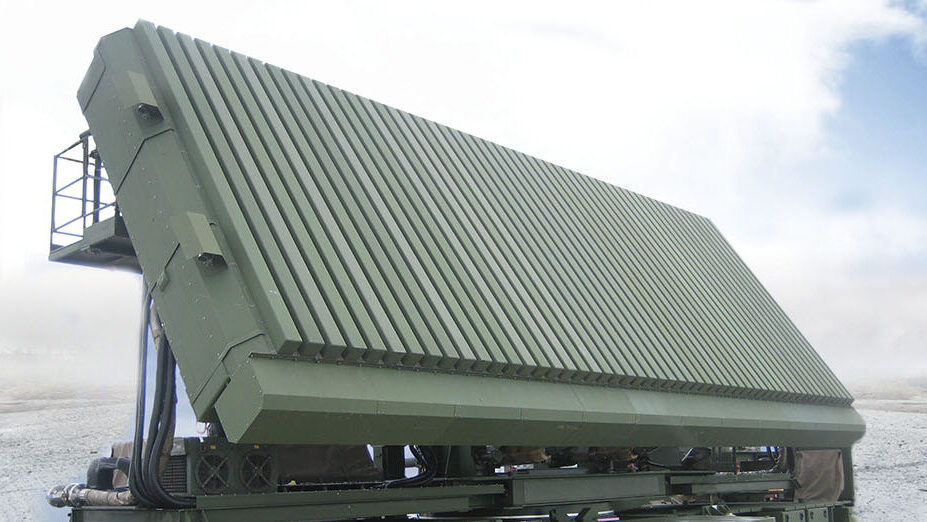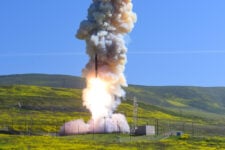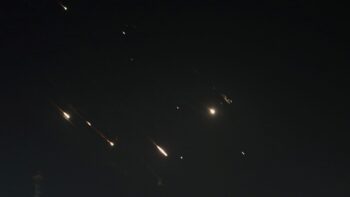
Israeli defense firm IAI shows of its ELM-2080/2080S Green Pine Long Range Anti-Ballistic Missile Radar. (IAI)
TEL AVIV: In recent days the United Arab Emirates embassy in Tel Aviv has reached out to the Israeli Ministry of Defense to judge how a formal request that Jerusalem send an advanced Israeli radar to the UAE would be received, Breaking Defense has learned.
The UAE is seeking the advanced version of the Green Pine radar, part of the Israeli Arrow system that is designed to intercept ballistic missiles, as the Gulf nation deals with another week of strikes from Houthi rebels within Yemen. If Israel were to agree, it would mark the first major military technology acquisition between the two nations.
If the sale is approved, the radars will be purchased by the UAE and after a short training session in Israel, and the Emiratis will operate them themselves. While Israeli companies have sold cyber systems and homeland defense gear to the UAE in the past, an advanced radar system represents another level.
The Israeli MoD declined to comment, but two defense sources told Breaking Defense on Jan. 31 that the UAE is pursuing the Israeli solution for detecting ballistic missiles from long ranges. No decision has been made at this point, per the sources, with an evaluation of the request to occur in the coming days; should the MoD back the move, the UAE will then file an official request for the system.
RELATED: Amid attacks, UAE quietly asks Israel about defense systems: Sources
Spokespeople for the UAE embassy in Israel referred questions to the Ministry of Foreign Affairs, which referred questions to the embassy in Washington, which did not respond by press time.
According to Elta, the electronics subsidiary of Israel Aerospace Industries, the Green Pine Radar can detect and simultaneously track dozens of missiles from long ranges under all weather conditions. The UAE is interested in the advanced version the ELM-2080S, the sources say.
The request comes at a moment when both UAE and Israel’s interests align. A Jan. 30 attack on the UAE coincided with a visit by Israeli president Yitzhak Herzog. According to a statement made by the UAE, the country’s air defenses intercepted and destroyed a ballistic missile in the attack, though the US military said it also fired Patriot inteceptors during the attack. A day later, Houthi rebels in Yemen announced that they intend to attack the offices of international companies in the Emirates, and called on citizens to stay away from sensitive facilities.
Israel, meanwhile, is preparing for a potential Houthi attack on targets in the Eilat area, the resort city on the Red Sea, with identified threats including both cruise missiles and long-range drones. The defense systems in the area are on high alert and the Israeli defense forces (IDF) are using all its “sensors” to get an early warning on such an attack.
The Houthis have expressed anger about the alleged presence of Israeli forces on an Island in Yemen territory. In September 2021 Yemen’s ambassador to Iran, Ibrahim Mohammad Mohammad al-Deilami, cited Israel’s presence in Yemeni territories, especially in a number of strategic islands.
“There is also an Israeli presence, especially in Yemeni territorial waters and some strategic islands, whether on Hanish Island, Mayun Island, or even on Socotra Island in the Arabian Sea,” al-Deilami told the Tehran Times then.
Uzi Rabi, one of Israel’s top experts on Iran, told Breaking Defense that there is no doubt that the Houthis have a future plan to hit Israel with long-range weapons. “By repeatedly attacking the UAE Teheran signals that it will not accept the new cooperation between the UAE created by the Abraham Accords,” he said.
Still, despite the potential threat, open source material has not shown any actual attacks on Israel from the Houthis. Instead, there have been simple threats, such as in 2019, when Houthi Minister of Defense Mohammed Nasser al-‘Atafi claimed in an interview that his forces possessed a bank of Israeli military targets. His next comment, however, was more telling, as he implied that the leadership had not yet decided to attack Israel, saying, “We will not hesitate to hit [Israel] whenever the leadership decides.
Ari Heistein and Elsha Stoin, two researchers in the Israeli institute for national security studies (INSS), believe it would be fairly difficult for the Houthis to actually damage Israel. Realistically, the researchers wrote, the Houthis would need something in the range of 1,800km to safely launch an attack into Israeli territory, a capability they have yet to show.
Move over FARA: General Atomics pitching new Gray Eagle version for armed scout mission
General Atomics will also showcase its Mojave demonstrator for the first time during the Army Aviation Association of America conference in Denver, a company spokesman said.


























